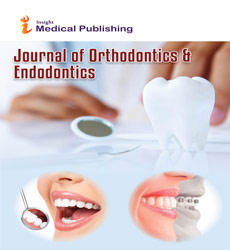Analgesic Use and Effectiveness of Dental Practices
William John
William John*
Department of Biotechnology, University of Edinburgh, UK.
- *Corresponding Author:
- William John
Department of Biotechnology
University of Edinburgh, UK.
E-mail: williamjohn250@gmail.com
Received Date: October 08, 2021; Accepted Date: October 13, 2021; Published Date: October 18, 2021
Citation: John W (2021) Analgesic Use and Effectiveness of Dental Practices. J OrthodEndod Vol. 7 No.10:57
Editorial
Analgesics are viewed as perhaps the main drug bunches in dental work on thinking about the remedy rate, clinical adequacy, cost-viability and wellbeing profile of this medication bunch. As indicated by this degree of significance in dental clinical practice, there are various ways to deal with foster treatment calculation and rules for dental torment treatment to support the utilization of analgesics. The defense of analgesics use is a continuous test; since certain analgesics are over-the-counter (OTC) medicates and can be taken without clinical solution. The administration of dental agony in clinical practice is a complicated piece of dental consideration and requires undeniable level information on pain relieving pharmacology and executing the guidelines of normal use. There is an important proof for huge connection between nonrational utilization of analgesics and reduction of medication treatment, expanded unfriendly medication responses and financial outcomes. In any case, solution of pain relieving drugs for dental signs is regularly went with challenges, which decrease the treatment achievement and increment the possible danger for genuine unfriendly impacts.
There are a few explanations behind the reduction in clinical viability of pain relieving treatment, including the absence of genuine evaluation and checking of torment by dentistry specialist, no adequate measurement of abstract torment experienced by patients, absence of refreshed pharmacological information on dental torment medicines, experience shortage in wellbeing profile of pain relieving and inadequate information in regards to pain relieving mixes. There is proof that solution mistakes with pain relieving medicaments are significantly high and are a significant reason for appearances of analgesics secondary effects. The level of pain relieving related solution mistakes, as detailed by, is generally high, with 29% in grown-up patients and in pediatric patients it is significantly higher at 59%. From all out solution rate, 14% were not kidding or extreme pain relieving remedy blunders with high unsafe potential for patients, fundamentally in pediatric patients.
The remedy of pain relieving medications and treatment of dental torment is more mind boggling when it is went with other wellbeing issues and sicknesses. In these cases, measurement of torment and its assessment and treatment is a tangled clinical test. The super complicated difficulties are patients with diabetes and other persistent sicknesses, patients with renal and hepatic inadequacy and patients with narcotic habit-forming messes. It expands medical care expenses and it is a danger for progress to persistent agony with antagonistic appearance in wellbeing and mental status of patients. The experience of delayed agony brings medical services laborers under more perplexing circumstances and the choice of fitting torment therapy is more troublesome.
Levelheaded remedy of analgesics in dentistry includes the determination of fitting pain killer, right clinical sign, choice of sufficient measurement and course of organization and execution of cost-viability and hazard benefits principles. Consequently, data with the goal of explaining a pain relieving's usage designs is considered as of high importance to advance the aggravation treatment in dentistry. Pain due to periapical and pulpal illness is considered as the most successive in dental wellbeing settings and it is an admonition sign and abstract impression of adjusted pulpodentinal tissue and periapical tissue.
Open Access Journals
- Aquaculture & Veterinary Science
- Chemistry & Chemical Sciences
- Clinical Sciences
- Engineering
- General Science
- Genetics & Molecular Biology
- Health Care & Nursing
- Immunology & Microbiology
- Materials Science
- Mathematics & Physics
- Medical Sciences
- Neurology & Psychiatry
- Oncology & Cancer Science
- Pharmaceutical Sciences
